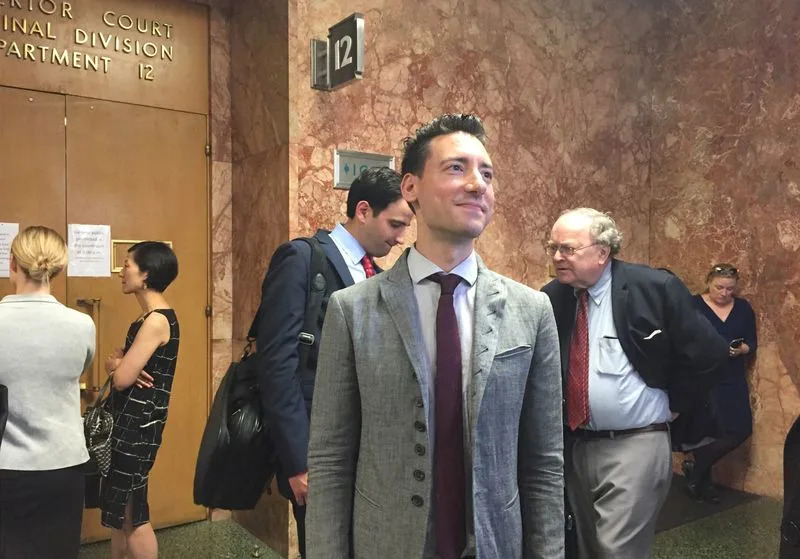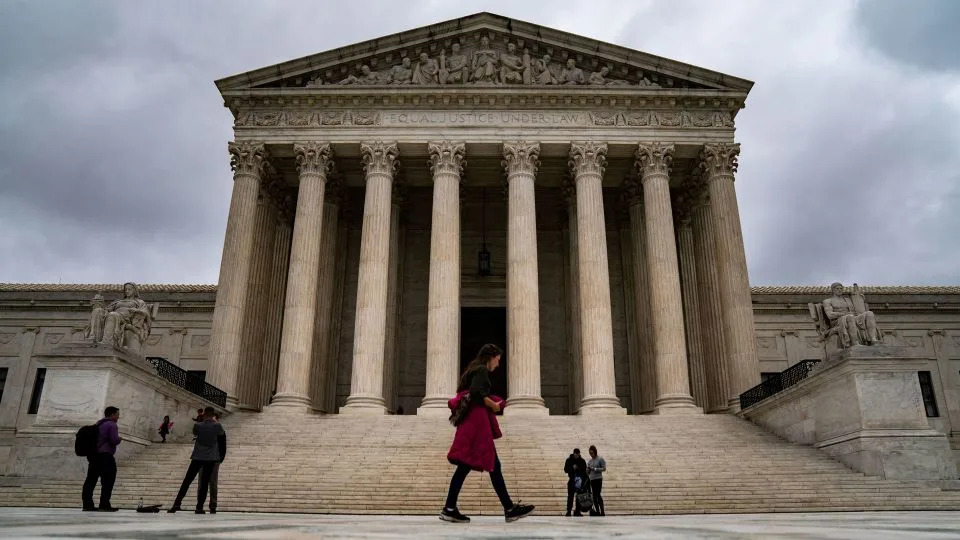US Supreme Court rebuffs dispute over videos targeting abortion providers
Andrew Chung
Mon, October 2, 2023

Anti-abortion activist David Daleiden, waits outside Superior Court in San Francisco
By Andrew Chung
WASHINGTON (Reuters) -The U.S. Supreme Court on Monday declined to hear a bid by anti-abortion activists to throw out more than $2 million in damages they were ordered to pay Planned Parenthood after secretly recording video of abortion providers in a scheme to try to show the illicit sale of aborted fetal tissue for profit.
The justices turned away the appeal by David Daleiden and his group, the Center for Medical Progress, of a lower court's decision in 2022 upholding most of the damages in a lawsuit by Planned Parenthood, a women's healthcare and abortion provider, accusing the defendants of conspiracy, eavesdropping and other claims. The lower court rejected the argument made by the defendants that with the secret recording they were exercising their right to free speech under the U.S. Constitution.
The justices announced their action on the first day of their new nine-month term.
Planned Parenthood filed suit in 2016 against Daleiden and his California-based organization in federal court in San Francisco seeking monetary damages, accusing them of violating the Racketeer Influenced and Corrupt Organizations Act (RICO) and engaging in fraud, trespassing, breach of contract and illegal secret recording.
The case before the Supreme Court centered on whether Planned Parenthood, even though it did not sue for defamation, should have to overcome strict limits that the justices through past rulings have placed on damages that public figures may recover for alleged harms related to a publication.
Various activist groups on the left and right conduct undercover operations often involving secret recording. Daleiden and his team portray themselves as investigative journalists and have said that the judgment against them in the suit threatens undercover reporting, a technique that can help expose wrongdoing and corruption.
Planned Parenthood has said the defendants are "ideological activists" - not journalists - whose videos were heavily edited as part of a smear campaign aimed at destroying the organization.
Using a shell company and fake identification, the activists gained access to Planned Parenthood and National Abortion Federation conferences and other locations where they recorded staff using hidden cameras.
The Center for Medical Progress released videos in 2015 purporting to expose Planned Parenthood officials trafficking in aborted fetal parts, sparking controversy, congressional inquiries and investigations in various states.
Planned Parenthood denied profiting from fetal tissue donation for medical research. Lower courts concluded that the videos did not contain evidence of wrongdoing.
A jury sided with Planned Parenthood in the lawsuit, and a judge awarded $2.4 million in damages - including for security costs to prevent future infiltration and targeting of doctors and staff - as well as more than $13 million in attorneys' fees and costs that are the subject of a separate appeal.
The San Francisco-based 9th U.S. Circuit Court of Appeals upheld most of the award last year, concluding that the First Amendment did not protect the defendants.
Noting that damages had been awarded for harms related to the infiltration, not to Planned Parenthood's reputation, the 9th Circuit said, "Invoking journalism and the First Amendment does not shield individuals from liability for violations of laws applicable to all members of society."
Daleiden and another activist also face an upcoming criminal trial in California in connection with the secret recordings.
(Reporting by Andrew Chung; Editing by Will Dunham)
Supreme Court declines to take up appeal from anti-abortion group that secretly recorded clinics
The case before the Supreme Court centered on whether Planned Parenthood, even though it did not sue for defamation, should have to overcome strict limits that the justices through past rulings have placed on damages that public figures may recover for alleged harms related to a publication.
Various activist groups on the left and right conduct undercover operations often involving secret recording. Daleiden and his team portray themselves as investigative journalists and have said that the judgment against them in the suit threatens undercover reporting, a technique that can help expose wrongdoing and corruption.
Planned Parenthood has said the defendants are "ideological activists" - not journalists - whose videos were heavily edited as part of a smear campaign aimed at destroying the organization.
Using a shell company and fake identification, the activists gained access to Planned Parenthood and National Abortion Federation conferences and other locations where they recorded staff using hidden cameras.
The Center for Medical Progress released videos in 2015 purporting to expose Planned Parenthood officials trafficking in aborted fetal parts, sparking controversy, congressional inquiries and investigations in various states.
Planned Parenthood denied profiting from fetal tissue donation for medical research. Lower courts concluded that the videos did not contain evidence of wrongdoing.
A jury sided with Planned Parenthood in the lawsuit, and a judge awarded $2.4 million in damages - including for security costs to prevent future infiltration and targeting of doctors and staff - as well as more than $13 million in attorneys' fees and costs that are the subject of a separate appeal.
The San Francisco-based 9th U.S. Circuit Court of Appeals upheld most of the award last year, concluding that the First Amendment did not protect the defendants.
Noting that damages had been awarded for harms related to the infiltration, not to Planned Parenthood's reputation, the 9th Circuit said, "Invoking journalism and the First Amendment does not shield individuals from liability for violations of laws applicable to all members of society."
Daleiden and another activist also face an upcoming criminal trial in California in connection with the secret recordings.
(Reporting by Andrew Chung; Editing by Will Dunham)
Supreme Court declines to take up appeal from anti-abortion group that secretly recorded clinics
Ariane de Vogue, CNN Supreme Court Reporter
Mon, October 2, 2023

Kent Nishimura/Los Angeles Times/Getty Images
The Supreme Court declined on Monday to take up an appeal from an anti-abortion group known for releasing secretly recorded footage of abortion providers, leaving in place a lower court ruling that went in favor of Planned Parenthood.
The anti-abortion group had argued that its actions were protected by the First Amendment and sought to reverse millions of dollars in damages awarded to the abortion providers.
The case involved David Daleiden, a longtime anti-abortion activist who partnered with other like-minded activists, Troy Newman and Albin Rhomberg, to start a group called the Center for Medical Progress, meant to infiltrate organizations like Planned Parenthood.
According to court papers, they created a tissue procurement company they called BioMax. Such companies obtain human tissue samples, including fetal tissue, and provide them to medical researchers.
Although the company had a website and promotional materials, it was not involved in any business activity. Daleiden, using a false name, posed as the company’s procurement manager and vice president of operations.
According to court papers, employees used fake driver’s licenses and other means to infiltrate conferences that Planned Parenthood hosted or attended, and they arranged and attended lunch meetings and with Planned Parenthood staff, visiting health clinics. During these meetings, they recorded Planned Parenthood staff without their consent over a year and a half and then released on the internet edited videos of the conversations.
Planned Parenthood brought suit in January 2016 asking for monetary damages and other relief.
A district court ruled in favor of Planned Parenthood and awarded the group statutory, compensatory and punitive damages.
A panel of judges on the 9th circuit agreed that the damages were allowed under the First Amendment but rejected the claim under the Federal Wiretap Act.
“The First Amendment right to gather news within legal bounds does not exempt journalists from thaws of general applicability,” the court held.
“The First Amendment is not a license to trespass, to steal or to intrude by electronic means into the precincts of another’s home or office,” the court said in its opinion.
For more CNN news and newsletters create an account at CNN.com
No comments:
Post a Comment